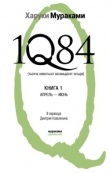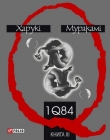
Текст книги "1q84"
Автор книги: Haruki Murakami
Жанр:
Современная проза
сообщить о нарушении
Текущая страница: 76 (всего у книги 81 страниц)
“This house was dubbed the ‘Tower.’ He designed it so it resembled the village huts he had seen on a trip to Africa. The inside was one big open space where everything went on. A very simple residence. He felt this was all one needed to live. The house had no electricity, gas, or running water. He got water from the nearby mountains. What he found out later, though, was that this was just an archetype and nothing else. As time went on, he found it necessary to build partitions and divisions in the house, and a second floor, and later he added on several wings. He created paintings himself on the wall. These were suggestive of the development and split in individual consciousness. The whole house functioned as a sort of three-dimensional mandala. It took him twelve years to complete the entire house. For Jungian researchers, it’s an extremely intriguing building. Have you heard of this before?”
Ushikawa shook his head.
“The house is still standing on the banks of the lake in Zurich. Jung’s descendants manage it, but unfortunately it’s not open to the public, so people can’t view the interior. Rumor has it, though, that at the entrance to the original tower there is a stone into which Jung carved some words with his own hand. ‘Cold or Not, God Is Present.’ That’s what he carved into the stone himself.”
Tamaru paused again.
“ ‘Cold or Not, God Is Present,’ ” he intoned, quietly, once more.
“Do you know what this means?”
Ushikawa shook his head. “No, I don’t.”
“I can imagine. I’m not sure myself what it means. There’s some kind of deep allusion there, something difficult to interpret. But consider this: in this house that Carl Jung built, piling up the stones with his own hands, at the very entrance, he found the need to chisel out, again with his own hands, these words. I don’t know why, but I’ve been drawn to these words for a long time. I find them hard to understand, but the difficulty in understanding makes it all the more profound. I don’t know much about God. I was raised in a Catholic orphanage and had some awful experiences there so I don’t have a good impression of God. And it was always cold there, even in the summer. It was either really cold or outrageously cold. One or the other. If there is a God, I can’t say he treated me very well. Despite all this, those words of Jung’s quietly sank deep into the folds of my soul. Sometimes I close my eyes and repeat them over and over, and they make me strangely calm. ‘Cold or Not, God Is Present.’ Sorry, but could you say that out loud?”
“ ‘Cold or Not, God Is Present,’ ” Ushikawa repeated in a weak voice, not really sure what he was saying.
“I can’t hear you very well.”
“ ‘Cold or Not, God Is Present.’ ” This time Ushikawa said it as distinctly as he could.
Tamaru shut his eyes, enjoying the overtones of the words. Eventually, as if he had made up his mind about something, he took a deep breath and let it out. He opened his eyes and looked at his hands. He had on disposable latex gloves so he wouldn’t leave behind any fingerprints.
“I’m sorry about this,” Tamaru said in a low voice. His tone was solemn. He took out the plastic bag again, put it over Ushikawa’s head, and wrapped the thick rubber band around his neck. His movements were swift and decisive. Ushikawa was about to protest, but the words didn’t form, and they never reached anyone’s ears. Why is he doing this? Ushikawa thought from inside the plastic bag. I told him everything I know. So why does he have to kill me?
In his head, about to burst, he thought of his little house in Chuorinkan, and about his two young daughters. And the dog they owned. The dog was small and low to the ground and Ushikawa never could bring himself to like it. The dog never liked him, either. The dog wasn’t very bright, and barked incessantly. It chewed the rugs and peed on the new flooring in the hallway. It was a totally different creature from the clever mutt he had had as a child. Still, Ushikawa’s final conscious thoughts in this life were of the silly little dog scampering around the lawn in their backyard.
Tamaru watched as Ushikawa, his body tightly bound into a ball, writhed on the tatami like some huge fish out of water. Ushikawa’s arms and legs were tied behind him, so no matter how much he struggled, the neighbors next door wouldn’t hear a thing. Tamaru knew very well what a hideous way to die this was. But it was the most efficient, cleanest way to kill someone. No screams, no blood. Tamaru followed the second hand on his Tag Heuer diver’s watch. After three minutes Ushikawa stopped thrashing around. His body trembled slightly, as if resonating to something, and then the trembling stopped. Tamaru looked at his wristwatch for another three minutes. He felt Ushikawa’s wrist for a pulse and confirmed that all signs of life had vanished. There was a faint whiff of urine. Ushikawa had lost control of his bladder again, this time emptying it completely. Understandable, considering how much he had suffered.
Tamaru removed the rubber band and peeled away the plastic bag. The bag had been partly sucked into his mouth. Ushikawa’s eyes were wide, his mouth open and twisted to one side in death. His dirty, irregular teeth were bared, his tongue with its greenish moss visible. It was the kind of expression Munch might have painted. Ushikawa’s normally misshapen head looked even more lopsided. He must have suffered terribly.
“I’m sorry about this,” Tamaru said. “I didn’t do it because I wanted to.”
Tamaru used his fingers to relax the muscles of Ushikawa’s face, straighten out the jaw, and make his face more presentable. He used a kitchen towel to wipe away the drool from Ushikawa’s mouth. It took a while, but his face began to look a bit better. At least a person looking at it wouldn’t avert their eyes. But no matter how hard he tried, he couldn’t get Ushikawa’s eyes to shut.
“Shakespeare said it best,” Tamaru said quietly as he gazed at that lumpish, misshapen head. “Something along these lines: if we die today, we do not have to die tomorrow, so let us look to the best in each other.”
Was this from Henry IV, or maybe Richard III? Tamaru couldn’t recall. To him, though, that wasn’t important, and he doubted Ushikawa wanted to know the precise reference. Tamaru untied his arms and legs. He had used a soft, towel-like rope, and he had a special way of tying it so as to not leave marks. He took the rope, the plastic bag, and the heavy-duty rubber band and stowed them in a plastic bag he had brought with him for that purpose. He rummaged through Ushikawa’s belongings and collected every photo he had taken. He put the camera and tripod in the bag as well. It would only lead to trouble if it got out that Ushikawa had been conducting surveillance. People would ask who he was watching, and the chances were pretty good that Tengo Kawana’s name would surface. He took Ushikawa’s notebook, too, crammed full of detailed notes. He made sure to collect anything of importance. All that was left behind were the sleeping bag, eating utensils, extra clothes, and Ushikawa’s pitiful corpse. Finally, Tamaru took out one of Ushikawa’s business cards, the ones that said he was Full-time Director, New Japan Foundation for the Advancement of Scholarship and the Arts, and pocketed it.
“I’m really sorry,” Tamaru said again as he was leaving.
. . .
Tamaru went into a phone booth near the station, inserted a telephone card into the slot, and dialed the number Ushikawa had given him. It was a local Tokyo number, Shibuya Ward by the look of it. The phone rang six times before someone answered.
Tamaru skipped the preliminaries and told him the address and room number of the apartment in Koenji.
“Did you write it down?”
“Could you repeat it?”
Tamaru did so. The man wrote it down and read it back.
“Ushikawa is there,” Tamaru said. “You are familiar with Ushikawa?”
“Ushikawa?”
Tamaru ignored what he said and continued. “Ushikawa is there, and unfortunately he isn’t breathing anymore. It doesn’t look like a natural death. There are several business cards with Full-time Director, New Japan Foundation for the Advancement of Scholarship and the Arts on them in his business card holder. If the police find these, eventually they will figure out the connection with you. That wouldn’t be to your advantage, I imagine. Best to dispose of everything as soon as you can. That’s what you’re good at.”
“Who are you?” the man asked.
“Let’s just say I’m a kind informant,” Tamaru said. “I’m not so fond of the police myself. Same as you.”
“Not a natural death?”
“Well, he didn’t die of old age, or very peacefully.”
The man was quiet for a moment. “What was this Ushikawa doing there?”
“I don’t know. You would have to ask him the details, and as I explained, he’s not in a position to respond.”
The man on the other end of the line paused. “You must be connected with the young woman who came to the Hotel Okura?”
“That’s not the sort of question to which you can expect an answer.”
“I’m one of the people who met her. Tell her that and she’ll understand. I have a message for her.”
“I’m listening.”
“We’re not planning to harm her,” the man said.
“My understanding is that you are trying your best to track her down.”
“That’s right. We’ve been trying to locate her for some time.”
“Yet you’re telling me you don’t plan to harm her,” Tamaru said. “Why is that?”
There was a short silence before the response came.
“At a certain point the situation changed. Leader’s death was deeply mourned by everyone. But that’s over, finished. Leader was ill, and, in a sense, he was hoping to put an end to his suffering. So we don’t plan to pursue Aomame any further regarding this matter. Instead, we would simply like to talk with her.”
“About what?”
“Areas of common interest.”
“That’s just what your people want. You may feel the need to speak with her, but maybe that isn’t what she wants.”
“There should be room for discussion. There are things that we can provide you. Freedom, for instance, and safety. Knowledge and information. Can’t we find a neutral place to discuss this? Name the location. We will go wherever you say. I guarantee her safety, one hundred percent—and not just hers, but the safety of everyone involved. There’s no need to run away anymore. I think this is a reasonable request, for both sides.”
“That’s what you say,” Tamaru said. “But there is no reason I should trust you.”
“At any rate, I would appreciate it if you would let Aomame know,” the man said patiently. “Time is of the essence, and we’re still willing to meet you halfway. If you need more proof of our reliability, we’ll provide it. You can call here anytime and get in touch with us.”
“I wonder if you could give me a few more details. Why is she so important to you? What happened to bring about this transformation?”
The man took a short breath before he replied. “We have to keep hearing the voice. For us it’s like a never-ending well. And we can’t ever lose it. That’s all I can tell you at this time.”
“And you need Aomame in order to keep that well.”
“It’s hard to explain. It’s connected, but that’s all I can say.”
“What about Eriko Fukada? You don’t need her anymore?”
“No, not anymore. We don’t care where she is, or what she’s doing. Her mission is finished.”
“What mission?”
“That’s sensitive information,” the man said after a pause. “I’m sorry, but I can’t reveal anything more at this time.”
“I suggest you consider your position very carefully,” Tamaru said. “In this game we’re playing, it’s my serve. We can get in touch with you anytime we want, but you can’t get in touch with us. You don’t even know who we are. Correct?”
“You’re right. You do have the advantage. We don’t know who you are. But this isn’t something we should speak about on the phone. I’ve already said too much, more than I’m authorized to.”
Tamaru was silent for some time. “All right. We’ll consider your proposal. We need to talk it over on our end. I will probably be getting in touch with you later.”
“I will be waiting to hear from you,” the man said. “As I said before, this could be to the advantage of both sides.”
“What if we ignore your proposal, or reject it?”
“Then we would have to do things our way. We have a certain amount of power, and unfortunately, things might get a little rough. This could cause problems for everyone involved. No matter who you are, you won’t come through this unscathed. I don’t see how that could be the ideal outcome for either of us.”
“You may be right. But it will take a while before we get to that point. And as you said, time is of the essence.”
The man gave a small cough. “It might take time. Or maybe not so much.”
“You won’t know unless you try.”
“Exactly,” the man said. “There’s one more important thing I need to point out. To borrow your metaphor, in this game it’s your serve. But it doesn’t seem to me like you’re familiar with the basic rules of the game.”
“That’s another thing you can’t know unless you actually try it.”
“If you do try it and it doesn’t work, that would be a shame.”
“For both of us,” Tamaru said.
A short, suggestive silence followed.
“What do you plan to do about Ushikawa?” Tamaru asked.
“We’ll take charge of him at the earliest opportunity. As early as tonight.”
“The apartment is unlocked.”
“Much appreciated,” the man said.
“By the way, will you all deeply mourn Ushikawa’s death?”
“We deeply mourn any person’s death.”
“You should mourn over him. He was, in his own way, a capable man.”
“But not capable enough. Is that what you’re saying?”
“No man is capable enough to live forever.”
“So you say,” the man said.
“Yes, I do think that. Don’t you?”
“I’ll wait for your call,” the man said, without answering, his voice cold.
Tamaru silently hung up the phone. There was no need for any more talk. If he wanted to talk further, he would call them. He left the phone booth and walked to where he had parked his car—an old, drab, dark blue Toyota Corolla van, totally inconspicuous. He drove for fifteen minutes, pulled up next to an empty park, checked that there was no one watching, and tossed the plastic bag with the rope and the rubber band into a trash can. Plus the surgical gloves.
“They deeply mourn any person’s death,” Tamaru said in a low voice as he started the engine and snapped on his seatbelt. Good—that’s what’s most important, he thought. Everyone’s death should be mourned. Even if just for a short time.
CHAPTER 26
Aomame
VERY ROMANTIC
The phone rang at just past noon on Tuesday. Aomame was seated on her yoga mat, legs wide apart, stretching her iliopsoas muscles. It was a much more strenuous exercise than it looked. A light sheen of perspiration was starting to seep through her shirt. She stopped, wiped her face with a towel, and answered the phone.
“Bobblehead is no longer in that apartment,” Tamaru said, as always omitting any sort of greeting. No hellos for him.
“He’s not there anymore?”
“No, he’s not. He was persuaded.”
“Persuaded,” Aomame repeated. She imagined this meant that Tamaru had, through some means, forcibly removed Bobblehead.
“Also, the person named Kawana who lives in that building is the Tengo Kawana you have been looking for.”
The world around Aomame expanded, then contracted, as if it were her own heart.
“Are you listening?” Tamaru asked.
“I am.”
“But Tengo Kawana isn’t in his apartment right now. He has been gone for a couple of days.”
“Is he all right?”
“He’s not in Tokyo now, but he’s definitely all right. Bobblehead rented an apartment in Tengo’s building, and was waiting there for you to come see Tengo. He had set up a hidden camera and was keeping watch over the entrance.”
“Did he take my picture?”
“He took three photos of you. It was nighttime, and you had on a hat, glasses, and a muffler, so you can’t see any facial details in the photos. But it’s you. If you had gone there one more time, things could have gotten sticky.”
“So I made the right choice leaving things up to you?”
“If there is such a thing as a right choice here.”
“Anyway,” Aomame said, “I don’t have to worry about him.”
“That man won’t be trying to do you any harm anymore.”
“Because you persuaded him.”
“I had to adjust some things as we went, but in the end, yes,” Tamaru said. “I got all the photos. Bobblehead’s aim was to wait until you showed up, and Tengo Kawana was merely the bait he was using to reel you in. So I can’t see that they would have any reason now to harm Tengo. He should be fine.”
“That’s a relief,” Aomame said.
“Tengo teaches math at a cram school in Yoyogi. He is apparently an excellent teacher, but he only works a few days a week, so he doesn’t make much money. He’s still single, and he lives modestly in that simple apartment.”
When Aomame closed her eyes she could hear her heartbeat inside her ears. The boundary between herself and the world seemed blurred.
“Besides teaching math at the cram school, he is writing a novel. A long one. Ghostwriting Air Chrysalis was just a side job. He has his own literary ambitions, which is a good thing. A certain amount of ambition helps a person grow.”
“How did you find all this out?”
“He’s gone now, so I let myself into his apartment. It was locked, not that I would count that as a lock. I feel bad about invading his privacy, but I needed to do a basic check. For a man living alone, he keeps his place clean. He had even scrubbed the gas stove. The inside of his fridge was very neat, no rotten cabbage or anything tucked away in the back. I could see he had done some ironing as well. Not a bad partner for you to have. As long as he isn’t gay, I mean.”
“What else did you find out?”
“I called the cram school and asked about his teaching schedule. The girl who answered the phone said that Tengo’s father passed away late Sunday night in a hospital somewhere in Chiba Prefecture. He had to leave Tokyo for the funeral, and his Monday classes were canceled. She didn’t know when or where the funeral would take place. His next class is on Thursday, so it seems he will be back by then.”
Aomame remembered that Tengo’s father was an NHK fee collector. On Sundays Tengo had made the rounds of his father’s collection route with him. She and Tengo had run across each other a number of times on the streets of Ichikawa. She couldn’t remember his father’s face very well. He was a small, thin man who wore a fee collector’s uniform. He didn’t look at all like Tengo.
“Since there’s no more Bobblehead, is it all right if I go see Tengo?”
“That’s not a good idea,” Tamaru shot back. “Bobblehead was persuaded, but I had to get in touch with Sakigake to get them to take care of one last piece of business. There was one particular article I didn’t want to fall into the hands of the authorities. If that had been discovered, the residents of the apartment would have been gone over with a fine-tooth comb, and your friend might have gotten mixed up in it too. It would have been difficult for me to wrap up everything by myself. If the authorities spotted me lugging that article out in the middle of the night and questioned me, I don’t know how I would talk my way out of it. Sakigake has the manpower and the resources, and that’s the sort of thing they’re used to. Like the time they transported another article out of the Hotel Okura. Do you follow what I’m saying?”
In her mind Aomame translated Tamaru’s terminology into more straightforward vocabulary. “So this persuasion got rather rough, I take it.”
Tamaru gave a low groan. “I feel bad about it, but that man knew too much.”
“Was Sakigake aware of what Bobblehead was doing in that apartment?”
“He was working for them, but on that front he was acting on his own. He hadn’t yet reported to his superiors on what he was doing. Fortunately for us.”
“But by now they must know that he was up to something.”
“Correct. So you had best not go near there for a while. Tengo Kawana’s name and address have to be on their checklist. I doubt they know yet about the personal connection between you and Tengo. But when they search for the reason Bobblehead was in that apartment, Tengo’s name will surface. It’s only a matter of time.”
“If we’re lucky, it might be some time before they discover it. They might not make the connection between Bobblehead’s death and Tengo right away.”
“If we’re lucky,” Tamaru said. “If they’re not as meticulous as I think they are. But I never count on luck. That’s how I’ve survived all these years.”
“So I shouldn’t go near that apartment building.”
“Correct,” Tamaru said. “We made a narrow escape, and we can’t be too careful.”
“I wonder if Bobblehead figured out that I’m hiding in this apartment.”
“If he had, right now you would be somewhere I couldn’t get to.”
“But he came so close.”
“He did. But that was just coincidence, nothing more.”
“That’s why he could sit there on the slide, totally exposed.”
“Right,” Tamaru said. “He had no idea that you were watching him. He never expected it. And that was his fatal mistake. I said that, didn’t I? That there is a very fine line between life and death?”
A few seconds of silence descended on them. A heavy silence that a person’s—any person’s—death brings on.
“Bobblehead might be gone, but the cult is still after me.”
“I’m not so sure about that,” Tamaru said. “At first they wanted to grab you and find out what organization planned Leader’s murder. They know you couldn’t have done it on your own. It was obvious that you must have had backup. If they had caught you, you would have been in for some tough questioning.”
“Which is why I needed a pistol,” Aomame said.
“Bobblehead was well aware of all this,” Tamaru went on. “He knew the cult was after you to grill you and punish you. But somehow the situation has drastically shifted. After Bobblehead left the stage, I spoke with one of the cult members. He said they have no plans to do you any harm. He asked me to give you this message. It could be a trap, but it sounded genuine to me. The guy explained that Leader was actually hoping to die, that it was a kind of self-destruction. So there’s no need anymore to punish you.”
“He’s right,” Aomame said in a dry tone. “Leader knew from the outset that I had gone there to kill him. And he wanted me to kill him.”
“His security detail hadn’t seen through you, but Leader had.”
“That’s right. I don’t know why, but he knew everything beforehand,” Aomame said. “He was waiting for me there.”
Tamaru paused briefly, and then said, “What happened?”
“We made a deal.”
“This is the first I’ve heard of it,” Tamaru said, his voice stiff.
“I never had the opportunity to tell you.”
“Tell me what sort of deal you made.”
“I massaged his muscles for a good hour, and all the while he talked. He knew about Tengo. And somehow he knew about the connection between Tengo and me. He told me he wanted me to kill him. He wanted to escape the terrible physical pain he was in as soon as possible. If I would give him death, he said, he would spare Tengo’s life for me. So I made up my mind and took his life. Even if I hadn’t carried it out, he already had one foot in the grave, and when I considered the kinds of things he had done, I almost felt like letting him stay as he was, in such agony.”
“You never reported to Madame about this deal you made.”
“I went there to kill Leader, and I carried out my assignment,” Aomame said. “The issue with Tengo was private.”
“All right,” Tamaru said, sounding half resigned. “You most definitely did carry out your assignment, I’ll give you that. And the issue of Tengo Kawana is indeed a private matter. But somewhere either before or after this, you became pregnant. That’s not something that can be easily overlooked.”
“Not before or after. I got pregnant on that very night, the night of the huge rainstorm and terrible lightning that hit the city. On the same exact night when I dealt with Leader. As I said before, without any sex involved.”
Tamaru sighed. “Considering what we’re talking about, I either have to believe you or not believe you, one or the other. I have always found you to be a trustworthy person and I want to believe you, but I can’t fathom the logic. Understand, I am a person who can only follow deductive reasoning.”
Aomame was silent.
Tamaru went on. “Is there a cause-and-effect relationship between Leader’s murder and this mysterious pregnancy?”
“I really can’t say.”
“Is it possible that the fetus inside you is Leader’s child? That he used some method—what that would be I have no idea—and impregnated you? If that’s true, then I understand why they’re trying to get ahold of you. They need a successor to Leader.”
Aomame clutched the phone tight and shook her head. “That’s impossible. This is Tengo’s child. I know it for a fact.”
“That’s another thing I have to either trust you on or not.”
“Beyond that, I can’t explain anything.”
Tamaru sighed again. “All right. For the time being I’ll accept what you’re saying—that this baby is yours and Tengo’s, and that you know this for a fact. Still, I don’t see how it makes sense. At first they wanted to capture you and punish you severely, but at a certain point something happened—or they found out something. Now they need you. They said they guarantee your safety, and that they have something to offer you, and they want to meet directly to discuss this. What could have happened to account for this sudden turnaround?”
“They don’t need me,” Aomame said. “They need what’s inside my belly. Somewhere along the line they realized this.”
“Ho, ho,” one of the Little People intoned from somewhere.
“Things are moving a bit too fast for me,” Tamaru said. He gave a little groan again in the back of his throat. “I still don’t see the logical connection here.”
Well, nothing’s been logical since the two moons appeared, Aomame thought. That’s what stole the logic from everything. Not that she said this aloud.
“Ho, ho,” six other Little People joined in.
“They need someone to hear the voice,” Tamaru said. “The man I talked with on the phone was insistent about that. If they lose the voice, it could be the end of the religion. What hearing the voice actually means, I have no idea. But that’s what the man said. Does this mean that the child inside you is the one who hears the voice?”
Aomame laid a gentle hand on her abdomen. Maza and dohta, she thought to herself. The moons can’t hear about this.
“I’m not—really sure,” Aomame said, carefully choosing her words. “But I can’t think of any other reason they would need me.”
“But why would this child have that kind of special power?”
“I don’t know.” In exchange for his life, maybe Leader entrusted his successor to me, she thought. In order to accomplish that, on that stormy night he might have temporarily opened the circuits where worlds intersect, and joined Tengo and me as one.
Tamaru went on. “No matter who the father of that child is, or whatever abilities that child may or may not have when it’s born, you have no intention of negotiating with the cult, correct? You don’t care what they give you in exchange. Even if they solve all the riddles you’ve been wondering about.”
“I’ll never do it,” Aomame said.
“Despite your intentions, they may take what they want by force. By any means necessary,” Tamaru said. “Plus, you have a weak spot: Tengo Kawana. Perhaps the only weak spot you have, but it’s a big one. When they discover that, that’s where they’ll focus their attack.”
Tamaru was right. Tengo was both her reason for living and her Achilles’ heel.
Tamaru went on. “It’s too dangerous for you to stay there any longer. You need to move to a more secure location before they figure out the connection between you and Tengo.”
“There are no more secure places in this world,” Aomame said.
Tamaru mulled over her opinion. “Tell me what you’re thinking,” he said quietly.
“First, I have to see Tengo. Until that happens, I can’t leave here. No matter how dangerous it might be.”
“What are you going to do when you see him?”
“I know what I need to do.”
Tamaru was silent for a moment. “You’re crystal clear on that?”
“I don’t know if it will work out, but I know what I have to do. I’m crystal clear on that, yes.”
“But you’re not planning on telling me what it involves.”
“I’m sorry, but I can’t. Not just you, but anybody. If I told anyone about it, at that instant it would be disclosed to the whole world.”
The moons were listening carefully. So were the Little People. And this very room she was in. She couldn’t let it out of her heart, not one centimeter. She had to surround her heart with a thick wall so nothing could escape.
On the other end of the line Tamaru was tapping the tip of a ballpoint pen on a desk. Aomame could hear the dry, rhythmic noise. It was a lonely sound, lacking any resonance.
“Okay, then let’s get in touch with Tengo Kawana. Before that, though, Madame must agree to it. The task I’ve been given is to move you, as soon as possible, to another location. But you said you can’t leave there until you see Tengo. It doesn’t look like it will be easy to explain the reason to her. You understand that, right?”
“It’s very difficult to logically explain the illogical.”
“Exactly. As difficult as finding a real pearl in a Roppongi oyster bar. But I’ll do my best.”
“Thank you,” Aomame said.
“What you’re insisting on doesn’t make sense to me, no matter how I look at it. Still, the more I talk with you, the more I feel that maybe I can accept it. I wonder why.”
Aomame kept silent.
“Madame trusts you and believes in you,” Tamaru said, “so if you insist on it that much, I can’t see her finding a reason not to let you see Tengo. You and Tengo seem to have an unwavering connection to each other.”
“More than anything in the world,” Aomame said.
More than anything in any world, she repeated to herself.
“Even if I say it’s too dangerous, and refuse to contact Tengo, you’ll still go to that apartment to see him.”
“I’m sure I will.”
“And no one can stop you.”
“It’s pointless to try.”
Tamaru paused for a moment. “What message would you like me to give Tengo?”
“Come to the slide after dark. After it gets dark, anytime is fine. I will be waiting. If you tell him Aomame said this, he’ll understand.”





